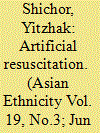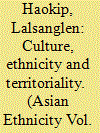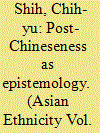|
|
|
Sort Order |
|
|
|
Items / Page
|
|
|
|
|
|
|
| Srl | Item |
| 1 |
ID:
158092


|
|
|
|
|
| Summary/Abstract |
Pan-Turkism emerged in the middle of the 19th century as an attempt to uniting all Turkic people along the Silk Road from the Mediterranean to China. After the ascent of modern Turkey under Mustafa Kemal as well as the Soviet incorporation of Central Asia, pan-Turkism had practically withered – although apparently not as an ideology. Indeed, the collapse of the Soviet Union and the subsequent independence of the Central Asia republics have provided for the revival of the pan-Turkism vision, perceived by Beijing as a threat not only to its interests in Central Asia but, moreover, to Xinjiang’s internal stability and China’s sovereignty. While this vision could hardly be accomplished, China’s intensive preoccupation with pan-Turkism has facilitated its artificial resuscitation, though it appears already deceased. Xi Jinping’s One Belt One Road initiative aims, among other things, at blocking pan-Turkism.
|
|
|
|
|
|
|
|
|
|
|
|
|
|
|
|
| 2 |
ID:
158094


|
|
|
|
|
| Summary/Abstract |
Creative literature and audio-visuals provide alternative sources to archival documents for understanding the cultural history of land. This paper is a small beginning in using creative sources in different languages of Manipur. My analysis suggests that the association between land and ethnicity is a recent phenomenon. In the late 1950s and the 1960s, creative artists represented land as aesthetic symbol for universal emotions. In the 1970s, land was de-linked from political imagination and appeared in the form of leikai (residential address). The 1980s registered the emergence of complex social forces such as ethnic nationalism and a romanticised folk culture. The most remarkable development was the exclusive use of land as a symbol of discrete identities and ethnic homelands. Whereas the ethnic gulf widened between the meiteis of the valley and the tribals of the hill areas, the struggle between the hill tribes intensified in the 1990s.
|
|
|
|
|
|
|
|
|
|
|
|
|
|
|
|
| 3 |
ID:
158095


|
|
|
|
|
| Summary/Abstract |
Following reclamation of ethnic identity amid the gnawing scarcities, Assamese ethnic movement germinated in the 1950s, manifested in the form of language and anti-migrants agitations. It became more apparent in the early 1960s. Despite the Assam accord, signed in 1985, certain section of the society with radical leanings picked up arms for a mission of secession from India. Unfortunately, State’s intervention seemingly failed to contain armed conflict, rather convoluted the situation and gave rise to hybrid ethnic identities. In this manner, since the 2000s, the entire state is engulfed in internal feuds. How have the Assamese movements shifted from the socio-cultural to armed struggle for secession and then to internal feuds, and why has the State failed in curbing them are discussed in this paper.
|
|
|
|
|
|
|
|
|
|
|
|
|
|
|
|
| 4 |
ID:
158096


|
|
|
|
|
| Summary/Abstract |
Jhumpa Lahiri’s The Lowland (2013) explores effects of the 1967 Communist Naxalbari uprising in West Bengal India. Irrespective of the glowing reviews the author earned for her truthful representations, the novel presents the pro-Communist uprising in a particular discursive regime that establishes a particular way of remembering and forgetting. Drawing on Foucault’s notion of ‘subjugated knowledges,’ this essay seeks to examine the epistemic hegemonies and mainstream perspectives of the novel that have confined particular experiences and memories of the movement to the margins and rendered them unworthy of epistemic respect in the battle among power/knowledge frameworks. The novel reconstitutes a gendered history of the movement in which women’s story of engagement is spatiotemporally erased and reformulated. I argue that the genealogy of this particular oversight is rooted in the heteronormative capitalist ideology of the States that exercises discursive power over individuals to fabricate a desired truth.
|
|
|
|
|
|
|
|
|
|
|
|
|
|
|
|
| 5 |
ID:
158091


|
|
|
|
|
| Summary/Abstract |
The current study relies on the social psychological notion of altercasting and the anthropological notion of post-Chineseness to appreciate the identity strategies of the Philippine’s China watchers. Basically, the case study suggests that the attainment of the sympathetic capacity to understand China can enrich the knowledge of those China watchers coming from an external position. However, adhering to an internal position of China watching would disempower ethnic Chinese scholars in the Philippines in fully participating in the indigenous community. Therefore, in the long run, the trend is for all ethnic scholars to establish distance from internal perspectives on China and practice watching China from the outside from time to time.
|
|
|
|
|
|
|
|
|
|
|
|
|
|
|
|
| 6 |
ID:
158093


|
|
|
|
|
| Summary/Abstract |
Diverse types of mobility have emerged in contemporary China, among which consumption-led ethnic retired migrants have received little academic attention. This study addresses the seasonal mobility of retired Tibetan migrants who previously had careers in governmental and public sectors in Tibet. After retirement, they purchase second-home apartments in Chengdu for health and leisure reasons. Through semistructured interviews, nonparticipant observation, and the application of Schnell’s multidimensional model, this article analyzes the migration and adaptation experiences of retired Tibetan migrants in Chengdu. It is revealed that, physically, they reside in mixed communities and share activity spaces with the local people, and, socially, maintain their life-long social relationships and form new local relationships. They feel satisfied and comfortable in their new situation, maintain their primary identity as Tibetan, and gradually establish a sense of home in Chengdu. Their political privilege and governmental support in the destination also contribute to their positive migration and adaptation experiences.
|
|
|
|
|
|
|
|
|
|
|
|
|
|
|
|
|
|
|
|
|